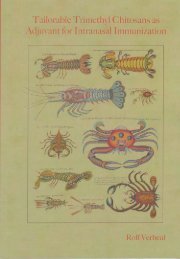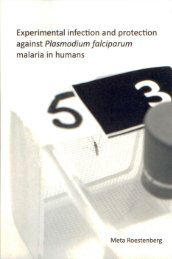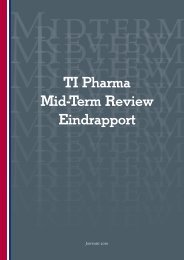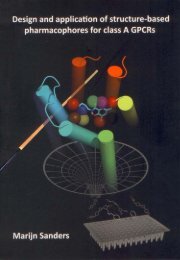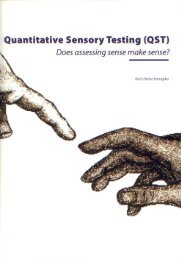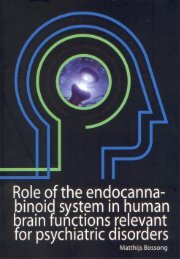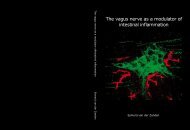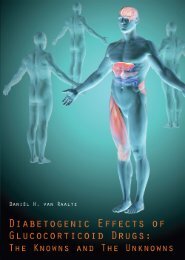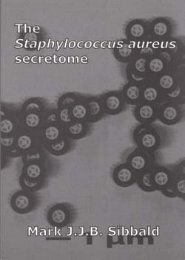towards improved death receptor targeted therapy for ... - TI Pharma
towards improved death receptor targeted therapy for ... - TI Pharma
towards improved death receptor targeted therapy for ... - TI Pharma
You also want an ePaper? Increase the reach of your titles
YUMPU automatically turns print PDFs into web optimized ePapers that Google loves.
Chapter 3<br />
ABSTRACT<br />
Tumor necrosis factor‐related apoptosis‐inducing ligand (TRAIL) can induce both caspase‐<br />
dependent apoptosis and kinase activation in tumor cells. Here, we examined the<br />
consequences and mechanisms of TRAIL‐induced MAPKs p38 and JNK in non‐small cell<br />
lung cancer (NSCLC) cells. In apoptosis sensitive H460 cells, these kinases were<br />
phosphorylated, but not in resistant A549 cells. Time course experiments in H460 cells<br />
showed that induction of p38 phosphorylation preceded that of JNK. To explore the<br />
function of these kinases in apoptosis activation by TRAIL, chemical inhibitors or siRNAs<br />
were employed to impair JNK or p38 functioning. JNK activation counteracted TRAIL‐<br />
induced apoptosis whereas activation of p38 stimulated apoptosis. Notably, the<br />
serine/threonine kinase RIP1 was cleaved following TRAIL treatment, concomitant with<br />
detectable JNK phosphorylation. Further examination of the role of RIP1 by short hairpin<br />
(sh)RNA‐dependent knockdown or inhibition by necrostatin‐1 showed that p38 can be<br />
phosphorylated in both RIP1‐dependent and ‐independent manner, whereas JNK<br />
phosphorylation occurred independent of RIP1. On the other hand JNK appeared to<br />
suppress RIP1 cleavage via an unknown mechanism. In addition, only the activation of JNK<br />
by TRAIL was caspase‐8‐dependent. Finally, we identified Mcl‐1, a known substrate <strong>for</strong> p38<br />
and JNK, as a downstream modulator of JNK or p38 activity. Collectively, our data suggest<br />
in a subset of NSCLC cells a model in which TRAIL‐induced activation of p38 and JNK have<br />
counteracting effects on Mcl‐1 expression leading to pro‐ or anti‐apoptotic effects,<br />
respectively. Strategies aiming to stimulate p38 and inhibit JNK may have benefit <strong>for</strong><br />
TRAIL‐based therapies in NSCLC.<br />
Key Words: TRAIL, kinases, combination <strong>therapy</strong>, lung cancer<br />
‐ 40 ‐



